Latest News
Fighting for Positive Change
Posted by on August 17, 2012 at 3:30 PM EDT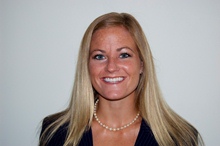 Morgan Tracey is being honored as a Champion of Change for her time and effort in AmeriCorps.
Morgan Tracey is being honored as a Champion of Change for her time and effort in AmeriCorps.
Although I graduated from AmeriCorps National Civilian Community Corps almost ten years ago, it seems like yesterday when I left small town Champion, Ohio with big dreams of serving others. Since my time in AmeriCorps, I have been a member of an elite Interagency Hotshot firefighting crew, I’ve graduated from law school and passed the Ohio bar, and I recently began training in the sport of skeleton with the hope of one day representing the United States in the Winter Olympic Games. People frequently ask me why I’ve chosen to pursue these diverse, challenging endeavors. My answer to this question is always the same. I pursue them because I want to take the path less traveled, and my experience in AmeriCorps gave me the courage to do so. Most importantly, AmeriCorps taught me following my heart could positively impact the lives of others. Whether sliding headfirst down a mile of ice at 90 miles per hour, or being the last line of defense between a wildfire and someone’s home, I’m fighting for positive change in my own communities.
An important part of AmeriCorps NCCC mission is to strengthen communities in which we work. In Blythe, CA we helped build twelve homes in which families could raise productive members of society. In Astoria, OR we built a multipurpose space for everything from meetings to disaster relief. In Pasadena, CA we inspired children and encouraged them to play together after school rather than sit in an empty house. In each and every community, we left it stronger than when we arrived.
Our community work was felt at a personal level as well. We inspired one another to be better teammates and better leaders. We learned to embrace change and encourage it in others.To this day I look with admiration at the accomplishments of my ten teammates since graduating AmeriCorps. We entered as young adults, some directly out of high school. Today we are doctors, lawyers, world class athletes, community leaders, and academics. My teammates have competed in World Cups for the US Women’s Rugby Team. They have volunteered their time teaching in Africa. They have earned Masters degrees and Ph.D.s while working on important community health initiatives. Individually we have done amazing things in our own unique ways, but we will always be united in our desire to effect positive change in our communities.
Being an elite athlete is a selfish undertaking. We spend hours, weeks, months, and years training for just a few moments of glory on the international stage. When I began my pursuit of an Olympic berth, I had to consider that most people will never make it to the Olympics and that I may be one of them. This would have been paralyzing were it not for the lessons I learned in AmeriCorps. I can lead by example. I can inspire positivity. I can dedicate myself to excellence. Most importantly, I can commit to leaving my sport a better place than when I arrived. Similarly to while in AmeriCorps and leaving our communities better than when we arrived. If I do these things, I will succeed.
I’m thankful every day for my time in AmeriCorps. It is the most important thing I have ever done. Without those experiences I would never have the courage to take the path less traveled. I would never have met the people who pushed me to embrace change while inspiring change in others. If this is what ten people can accomplish in ten short years, what will the future hold? And one day, as I dream of standing in front of a stadium packed with thousands, watching the American flag being raised as the National Anthem plays, it dawns on me. Not even an Olympic stadium can hold the 775,000 talented, inspiring, AmeriCorps alumni whose ranks I’m proud to be a part of.
Morgan Tracey is currently part of the United States National Skeleton Program training at the Lake Placid Olympic Training Center with her sights on Sochi Russia and Pyeongchang, South Korea.
Learn more about ServiceIntegrating Service Experiences and Career Choices
Posted by on August 17, 2012 at 3:26 PM EDT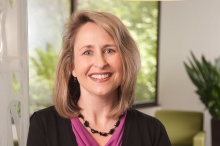 Nicole Trimble is being honored as a Champion of Change for her time and effort in AmeriCorps.
Nicole Trimble is being honored as a Champion of Change for her time and effort in AmeriCorps.
“You only have one precious life filled with a lot of options. The only thing you really need to do is leave this world a better place than you found it.”
I heard this often from my dad as a young, energetic girl growing up in suburban Cleveland, trying to find my place in the world. I should have known that my path to a fulfilling life and career would be through heeding his advice and finding my way through service.
My own story started as a child rooted in a family and faith community that valued service. I was raised with a belief in the reciprocal nature of service and that we all need to serve and be served in order for a society to function. In fact, the legacy of service in my family through the military and the Civilian Conservation Corps helped construct my belief that we all have a part to play in building and strengthening this great nation. I chose national service and to join AmeriCorps for many reasons but primarily because I love my country. What I did not know at the time, was how much I would be forever changed.
Service to my country through AmeriCorps was active participatory citizenship that would never allow me to look at my community and country from the sidelines again. My first year of service was as a Jesuit Volunteer providing legal services in Yakima, Washington. I was so inspired by the new AmeriCorps program that I enrolled for a second year of service as an AmeriCorps Leader launching ASPIRA AmeriCorps to provide opportunities to Latino youth. AmeriCorps inspired me to integrate my service experiences into my career choices, and also seeded my deep belief that providing all Americans opportunities to serve is a very important element building essential human connections and maintaining a strong democracy.
Although my AmeriCorps experience was about serving others, it provided me far greater gifts than I gave. I experienced that true self-interest is mutual interest. I understood for the first time how deeply we are all connected. We give and we receive. We serve and we are served. We are kind and kindness returns to us. This can be very difficult to live and remember in our current culture where we have to walk into the headwinds of cynicism at every turn. But I have committed to taking my AmeriCorps lessons with me into each professional experience and it has paid off. I have been blessed with more fulfilling career than I could have ever imagined and I owe much of it to national service.
I am currently responsible for Coinstar, Inc.’s Corporate Responsibility program. Last year after the tornados in Joplin, Missouri, I asked a crew of employees volunteering with the clean-up which organization in Joplin was doing the most impactful work so we could partner. The manager leading the initiative said “There is an amazing group here called AmeriCorps. Have you heard of AmeriCorps?”
Yes. I HAVE heard of AmeriCorps. I am AmeriCorps. And I am proud.
Nicole Trimble is the Director of Corporate Responsibility at Coinstar, Inc.
Learn more about ServiceBuilding a Community Organization to Improve Education
Posted by on August 17, 2012 at 3:24 PM EDT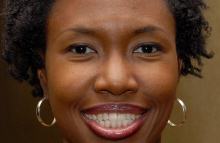 Rhonda Ulmer is being honored as a Champion of Change for her time and effort in AmeriCorps.
Rhonda Ulmer is being honored as a Champion of Change for her time and effort in AmeriCorps.
As a mother of three it has been a challenge for me to balance a life of children, work and school. It was difficult to incorporate them into my daily work and I wanted to find a way to set a great example for them. I got that chance in 2004, when I successfully made a rewarding career decision to join Volunteer Maryland (VM), an AmeriCorps program of the Governor’s Office.
Serving in AmeriCorps through VM provided me with the skills to not only help myself and family, but an entire school community. When a needs assessment was conducted of my children’s elementary school, the results were apparent why some children in our school were being left behind. The survey results revealed parents need of basic needs, educational resources and skills to help themselves to in turn help their children academically succeed.
As founder of the Van Bokkelen Family Network, the program provides local community resources such as GED, health, and housing education for parent in the school. Through the dedication and commitment of the network parent volunteer leaders, teachers, and community partners; the school is no longer on the Maryland State Department of Education takeover list, and the school has successfully sustained itself for over three years.
With the support of teachers and the community, Van Bokkelen Elementary families have healthier lifestyles, students have strengthened their math, science, history and other academic skills, and the school has become the hub of the community. PTA membership has grown significantly from 25 inactive members when I started to a larger network of active and engaged members who all help the school continue to make substantial yearly progress. The Van Bokkelen Family Network has led to a national PTA award for the group andthe model has been used to assist other troubled schools.
The huge success of my project inspired me to expand my vision of making every parent potential a reality across the State of Maryland. In 2008 after receiving the Eli J. Segal AmeriCorps Alums Entrepreneurship Award, I founded the University for Parents, a community organization that provides parents throughout Maryland with the skills and resources to help their family succeed. The organization helps mentor and educate parents with the skills they need to help their children be successful in school. I continue to share the Van Bokkelen story as a testimony that low performing schools can close the achievement gap through parental involvement. By educating, encouraging and motivating parents to succeed as a family, this becomes a win-win for the school and the community. It was not until my basic needs were met as a parent, was I able to help my children. I would be able to relate and lead by example for other parents through my own personal experience.
In 2004, I was unsure if I made the right decision to join AmeriCorps, but deep down in my heart I knew I had the desire to give and talents to bring out the best in others. My AmeriCorps service helped my dream for years to start a community organization that provides educational resources for parents come true.
Rhonda Ulmer is the founding director of University for Parents (UfP), a community organization that provides parents with the tools and resources to help their children succeed in school.
Learn more about ServiceService in the Private Sector
Posted by on August 17, 2012 at 3:20 PM EDTSeth Marbin is being honored as a Champion of Change for his time and effort in AmeriCorps.
AmeriCorps, and in particular City Year, profoundly shaped my personal values and helped clarify my life’s mission: to serve, and to help others serve. City Year also provided me with a toolkit for social change, and access to a diverse, inspiring and supportive community of change agents. It helped refine my theory of change, which involves leveraging both the private and public sectors’ resources for social good. I also met my future wife and amazing friends, mentors and heroes through City Year.
My AmeriCorps service journey began with the Youth Volunteer Corps of Corvallis, Oregon, where I grew up. I spent the summer after high school leading and mentoring youth on community service projects. We explored environmental science while installing erosion cloth on the banks of the river, learned about food insecurity preparing meals at a soup kitchen, and practiced event management by coordinating a city-wide skateboard competition. I gained the understanding that service is a powerful way to learn more about oneself and one’s community and break down social barriers.
I signed on for a second AmeriCorps term as a VISTA with the University of Puerto Rico in Ponce, with the goal of helping to improve literacy rates. Soon after we began, a major hurricane hit the island; we focused on disaster relief efforts for the next few months. Each day was an adventure: serving as a translator for doctors providing emergency aid in shelters, working on an assembly line to bottle safe drinking water, and helping coordinate delivery of relief supplies to remote towns with roads that had been washed away. I learned how to remain flexible to meet community and human needs, experienced profound kindness and compassion by many, and understood why it is hard for people to care about literacy when a blue FEMA tarp is their roof and they are unsure where the next meal is coming from.
Next I served in Seattle as an AmeriCorps Promise Fellow with City Year. I helped create and pilot the service-learning and leadership-development program, Young Heroes, which engaged thousands of youth nationwide.
As a public and private sector partnership, City Year’s model led to me to explore the role of the corporate sector in social change, which brought me in 2006 to Google, already a well-known global brand. Today, as a member of Google’s Social Responsibility Team, I help to encourage and enable employees around the world to use their skills, talents and resources in service and philanthropy. Daily, I use skills I developed in AmeriCorps as I meet with employees who want to make a positive difference and are seeking guidance, support and resources. I also put my experience to work when founding Googleserve, an annual tradition in which Googlers around the world join together in community service projects. Volunteering together helps to revitalize and strengthen our connections with the cities and towns in which we live and work, and also brings us closer together as a global team. Now in its 6th year, Googleserve has engaged more than 10,000 Googlers in over 40 countries.
I’m honored to be joining the Champions of Change community, and I wouldn't be here if not for incredible family, friends, and colleagues who have inspired and mentored me along my journey. I’m grateful for ongoing opportunities to give back. As a proud AmeriCorps alum, I will continue to help support and encourage others to be the change we seek in the world.
Seth Marbin is a Program Manager on the Social Resposibility Team at Google.
Learn more about ServiceTurn A Problem Into Your Passion
Posted by on August 17, 2012 at 3:00 PM EDTShonak Patel is being honored as a Champion of Change for his time and effort in AmeriCorps.
“Do what you like, like what you do.” These are the simple, yet powerful, words I heard from Life Is Good co-founder John Jacobs in the summer of 2011 while participating in the MassChallenge startup accelerator. After listening to Jacobs speak I couldn’t help but reflect on the experiences that got me to what I perceived to be a place of privilege, where I was pursuing a passion, tackling a real problem, and effectively blurring the lines between work and play with my first start-up, Swellr.
I grew up in Andover, MA in a family full of entrepreneurs and educators. Innovation, curiosity, and a desire to eliminate problems through creative thinking is in my blood. My whole life, I have been presented with every opportunity to try, to fail, to learn, to change, and to be inspired. The impossible has always seemed possible and that is solely a result of all the great teachers and learning experiences I have been exposed to along the way. As a teenager, I came to realize not everyone is fortunate enough to grow up in an environment that nurtures their confidence and encourages them to take on new challenges. As an incoming freshman, I made it my purpose to leverage entrepreneurship to help address societal needs and in doing so unlock the potential in others.
After working in the investment world for 4 years, I left my job in 2009 to serve with the LouisianaDeltaServiceCorps in New Orleans, LA. During my term of service, with NONDC, I had the privilege of working in one of the city’s most underserved — yet culturally rich neighborhoods — CentralCity. It was an experience defined by listening, observing, and identifying complicated challenges facing the community members I served. I supported a long-time resident in an arduous fight with the City to undo an erroneous property tax judgment. I listened to children playing basketball on 4th street tragically explain that a fear of being shot was the reason they weren’t using the beautiful new courts across the street at A.L. Davis Playground. I surveyed residents, planted trees, sat in on community meetings, and cleared blighted lots. I was quickly exposed to a diverse and complicated set of issues, brought on by the vicious cycle of poverty, which had trapped residents of this neighborhood, young and old, over and over again. AmeriCorps changed my life in helping me fundamentally shift the way I approach solving problems, from a prescriptive approach to a disruptive approach. AmeriCorps taught me that big, real, problems require big, systemic, change. This, as I have come to learn through experience, is the essence of innovation and entrepreneurship.
How could we disrupt the cycle of poverty? I began to challenge myself, and those around me, to imagine a world where everyone had access to a diverse set of educational resources and ongoing learning opportunities. What if everyone was equipped with the same support network and experiences I had been granted to continually discover, learn, and create new things? My AmeriCorps experience gave me the renewed clarity I needed to pursue this new vision, a vision for a world where the concepts of technology-enabled education, life-long learning, and creation are front and center. As a co-founder of Swellr, I diligently worked with my co-founders to find a new way to fund more educational resources into local classrooms. While this venture could not sustain itself in the longer term, I was inspired by the humbling power of failure to teach and considered myself once again lucky to have had another incredible opportunity to grow as a leader. Currently, as a co-founder of GatherEducation, I am once again working with a great team focused on making on-line learning experiences more engaging, more collaborative, and more accessible to teachers and learners everywhere.
This is how I got here. My learning experiences as a child, in service, and as an entrepreneur have taught me to inspire curiosity, a certain “need to know”, in others. I have learned to not fear failure, but to rather fear the status quo. Failure at its core means you are trying something new after all. I’ve been blessed to do what I love, and ultimately love what I do. Now, my focus is on helping others find their way to the same. I encourage everyone to find a big problem that impacts you or others around you, then turn it into a passion, and then push hard to turn it into progress. This is service. I promise you’ll never look back.
Shonak Patel is the co-founder of Gather Education.
Learn more about ServiceUtilizing Lessons from AmeriCorps as Mayor
Posted by on August 17, 2012 at 2:45 PM EDT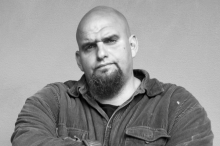 Mayor John Fetterman is being honored as a Champion of Change for his time and effort in AmeriCorps.
Mayor John Fetterman is being honored as a Champion of Change for his time and effort in AmeriCorps.
As the mayor of Braddock, Pennsylvania, one of the state’s poorest and most challenged communities, my service through AmeriCorps underpins much of my entire professional career and pays dividends daily.
In some respects, I’ve never left AmeriCorps. Just this past Friday, members from Allegheny County’s KEYS Service Corps celebrated their summer of service in our community’s playgrounds. Next week, KEYS Service Corps members will assist with the constructions of an off-leash area for dogs and help staff our Community Day celebration.
Without KEYS Service Corps, our community could not actively engage Braddock’s children during the summer months. But AmeriCorps involvement in our community extends far beyond our playgrounds. AmeriCorps also directs the largest and most successful youth summer jobs program in Allegheny County- The Braddock Youth Project.
Their service to Braddock also annually includes several large-scale service projects.
I’d like to believe I made a difference during my years in AmeriCorps setting up the first computer labs in Pittsburgh’s Hill District and teaching GED classes. Even 15 years after my formal service ended, I will still occasionally encounter a former student that is doing well for themselves and families.
Serving alongside members in Braddock reminds me of my own time with AmeriCorps. The partnership Braddock enjoys with KEYS Service Corps, without a doubt, is one of the most important and potent community rebuilding forces currently operating in Braddock today.
John Fetterman is the mayor of Braddock, Pennsylvania.
Learn more about ServiceServing the United States Through AmeriCorps
Posted by on August 17, 2012 at 2:39 PM EDT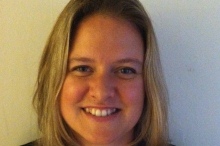 Dr. Sharon Wagner is being honored as a Champion of Change for her time and effort in AmeriCorps.
Dr. Sharon Wagner is being honored as a Champion of Change for her time and effort in AmeriCorps.
I am truly honored to be included in such a remarkable and dynamic group of social advocates as the Champions of Change. My own story of service began in middle school. I grew up in a small town on the South Shore of Boston, MA, and attended a very special camp on Cape Cod called Briarwood. This was a special place because through all the turmoil of emotions that accompanied adolescent years, it was the one place I could go among my peers and feel accepted. I wasn’t a religious child, but I felt a strong spiritual connection to God, humanity, and the Earth as we learned about each other and the Christian and Native American beliefs connected to society and the environment. After my second summer as a camper at Briarwood, I volunteered every summer for eight years as a camp counselor in order to ensure that other young people would be able to experience this connection and acceptance.
The experience at Briarwood allowed me to appreciate the gravity of the situation when at the age of 12, I read about the impending extinction of the rainforests around the world. The article lit a spark in me. It seemed so wrong from a spiritual perspective to be killing so many species that share the Earth with us. It seemed so foolish from a human perspective to be destroying the very thing that may hold the key to curing some of our most terrible diseases. As I learned more about environmental issues, I committed myself to a career path that would enable me to work toward protecting the environment and the people that depend on it. As an Environmental Science major at the University of Massachusetts Amherst, I had the opportunity to spend a week during my senior year as a participant in one of the first Alternative Spring Break trips. I traveled with a group of students and our instructor, Dr. Art Keene, to New Road, Virginia to learn about poverty, social justice, and grassroots development, while assisting with building renovations and cleanup in the community. This trip was my first experience with service learning, the concept of treating a volunteer experience as much as an opportunity for the volunteer to learn and grow from the community as for the community to benefit from the volunteer’s work. It was a concept that made a lot of sense to me. People don’t want someone riding in on their white horse to save them. They’re not going to trust that. But, if they realize it as a partnership, where they have something to give as well – if both the volunteer and the people they serve have pride in the work – that is when change is possible.
AmeriCorps was the natural next step when I graduated from UMass. As a 22-yr-old graduate, I wanted to save the world – I just didn’t know where to start. I applied to the Peace Corps, but when it came down to it, I looked around and saw so much need in our own country that I could not ignore. I wanted to serve the people of the United States of America. AmeriCorps National Civilian Community Corps (NCCC), with its focus on service learning, gave me that opportunity. I was stationed in Charleston, South Carolina and trained for acceptance into a wildfire-fighting team. Our team, Red 5, did three environmental projects in Florida, Georgia, and Tennessee, where we removed exotic vegetation, planted native vegetation, built trails and renovated park equipment. We did two education projects – at the Arkansas Children’s Hospital in Little Rock and at the South Carolina Teen Institute. And, we did two projects in the area of unmet human needs. We were team supervisors for two months for college students who volunteered on their spring breaks for Habitat for Humanity in Anniston, Alabama. Then, we used what we had learned in Alabama to renovate a shelter for abused and neglected children in Hope Haven, Mississippi. I received an email from the director of the shelter in 2005 that the building we renovated was one of very few left standing after Hurricane Katrina hit the area.
My experience with AmeriCorps was rewarding, challenging and memorable. It opened my eyes to the depth of need in the United States and to the unique, inviting culture of the South. It showed me the power of a small group of citizens committed to “Getting Things Done”. It gave me the confidence to work as a middle school science teacher in a Mexican barrio in San Diego, California even though I had no formal education training or experience with the culture. I taught for three years at King/Chavez Academy of Excellence and connected with my students using the service learning skills I had gained in AmeriCorps and Alternative Spring Break. The passion for learning about social and environmental issues in other cultures and educating youth led me to teach high school Environmental Systems for two years at Colegio Americano in Quito, Ecuador. I returned from Ecuador with renewed appreciation for the opportunity for change that exists in the United States and began to work toward a doctoral degree in Engineering and Public Policy at Carnegie Mellon University. As an Environmental Systems teacher in Ecuador, I had begun to appreciate that energy is the key issue at the intersection of environmental and social issues for our country and the world.
I am now an Assistant Professor in the School of Economics at the University of Maine, teaching about energy issues and working to advance a humane and sustainable energy future. As a public land-grant institution, the University of Maine is committed to serving the citizens of Maine, the nation and the world. I have the unique opportunity to collaborate with a group of highly skilled, intelligent, hard-working, and compassionate scientists to encourage the development of vast renewable energy resources in Maine and throughout the country in a way that improves social wellbeing. In a career path committed to service, my experience in AmeriCorps was a crucial step during a transition from youth to professional that gave me the confidence, knowledge and skills to solve critical social and environmental problems.
Dr. Sharon Wagner is an Assistant Professor in the School of Economics at the University of Maine.
Learn more about ServiceDriving Broadband Adoption in the Latino Community
Posted by on August 15, 2012 at 3:52 PM EDTEd. Note: This piece is cross-posted from the National Telecommunications and Information Administration.
I recently had the opportunity to speak to the National Association of Latino Elected and Appointed Officials (NALEO) and the League of United Latin American Citizens (LULAC) about NTIA Broadband Technology Opportunities Program (BTOP) and the work it is doing to promote broadband adoption in the Latino community.
A high-speed Internet connection can provide access to everything from online job postings to educational opportunities to valuable healthcare information. But too many Latino households remain cut off from these important benefits.
NTIA, in collaboration with the Census Bureau, conducts some of the most extensive survey work on broadband adoption trends in the U.S. Our most recent survey, in October of 2010, found that 72 percent of White households nationwide subscribed to broadband, compared with only 57 percent of Hispanic households. The survey also found that socioeconomic factors such as income and education do not fully explain the gap. Even after accounting for these factors through regression analysis, Hispanic households still lag White households in broadband adoption by 11 percentage points on a nationwide basis.
So NTIA BTOP program is supporting a number of projects specifically intended to benefit Latinos by funding computer centers in neighborhoods with large immigrant communities, by offering computer training and digital literacy classes in Spanish, and by helping Latino entrepreneurs and Latino-owned small businesses get established online. I'd like to tell you about a few of those projects.
- The Texas State Library Archives Commission is using BTOP funding to add and upgrade computer centers in libraries, community colleges, schools, recreation centers and other public buildings around the state. TheTechnology Expertise, Access and Learning for all Texans (TEAL) project is working through 38 local library systems across Texas to install 2,100 new workstations and upgrade 580 existing machines in more than 150 existing and new computer centers. The program is also funding statewide training for librarians so that they can provide job search, career development and technology assistance to patrons including many Latinos. The State Library Archives Commission used BTOP funds to create a Webinar series entitled Building Texas Latino Communities through Technology” for Texas library staff. And it is currently using BTOP funds to translate a computer training manual into Spanish. In addition, many of the libraries participating in the program are offering English-as-a-Second Language classes using BTOP-funded computers.
- A non-profit called the California Emerging Technology Fund (CETF) is using a BTOP investment to provide affordable computers, low-cost home broadband connections and digital workforce training for low-income residents and other vulnerable groups in California. CETF works through 19 partners statewide, including non-profits that offer job training and career development services for the unemployed and community organizations that serve California’s diverse ethnic populations. One partner, the Latino Community Foundation, is working through a network of eight community groups in the San Francisco Bay Area to provide digital literacy classes in Spanish to involve parents in their children education and help them find work. Another partner, Radio Bilingue, is educating migrant farm workers in California Central Valley about the utility of broadband and supplying pragmatic information on how to get connected. Yet another partner, the Chicana/Latina Foundation, gives college scholarships to young Hispanic women who serve as broadband ambassadors in their communities spreading the word about the benefits of broadband in places with low adoption rates.
- A San Francisco non-profit called the Mission Economic Development Agency (MEDA) is using a BTOP investment to open 12 new computer centers and expand five existing ones in more than a dozen low-to-moderate-income Latino neighborhoods across the U.S. Altogether, with outside matching funds, the program supports 20 computer centers around the country. The project called Latino Tech-Net is a collaboration among MEDA, the National Association for Latino Community Asset Builders and a network of local economic development organizations serving Latino communities. The 20 computer centers, which are equipped with 359 new machines paid for by BTOP, provide bilingual digital literacy training and adult education classes, as well as assistance with resume writing and job searches. The centers also offer customized technology workshops and one-on-one consultations covering topics such as budgeting and marketing to help Latino entrepreneurs establish and grow their businesses. Phoenix, Minneapolis, Kansas City and Philadelphia are just a few of the places that are home to the new computer centers.
There are many other BTOP-funded projects around the country also working to increase broadband adoption among Latinos. Momentum is building as more Hispanic households get online and encourage others to do so too. We hope the BTOP investments will play an important role in helping to close the digital divide in Latino communities across the U.S.
Anna Gomez is the Deputy Assistant Secretary for Communications and Information and Deputy Administrator at NTIA.
Learn more about Civil Rights
- &lsaquo previous
- …
- 110
- 111
- 112
- 113
- 114
- 115
- 116
- 117
- 118
- …
- next &rsaquo


Twitter